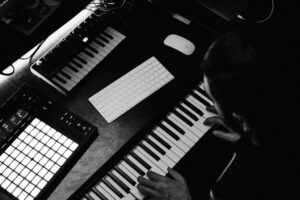
There’s a quick fix for every problem, but when it comes to growing as a musician, a band-aid approach to learning can cost you in the long run. Here are some music theory band-aids I’ve seen a lot of lately:
1. The Transpose Button
This one has been around for awhile, enabling keyboardists to play everything in C and put it in whatever key they want.
What it costs you: if you’re only playing in C, you’re probably relying more on muscle memory than you are on your ear. You’ve likely got a few voicings that you use for everything, which limits what you can do.
2. MIDI Packs
Producers can buy chord progressions and drop them into projects, dragging MIDI events up and down to match the key of their project.
What it costs you: time and originality. Instead of sitting down to come up with a chord progression that’s fully yours, and that meets the needs of the project exactly, you’ve got to take the time to hunt for it. And guess who else is combing through the same chords? Everyone else who bought that MIDI pack.
3. Hardware
There’s a popular Kickstarter-based MIDI controller that’s advertised as an alternative to learning music theory, and its Kickstarter campaign uses language like this: “The addition of 24 “direct modulation” and “modal interchange” hot keys unlock some of the most advanced techniques of music theory in an easy to use way. In the past you would need a comprehensive understanding of theory to even begin to toy with the idea of these two techniques.” And it’s not alone; there are plenty of gadgets out there that claim to solve your music theory “problems.”
What it costs you: Well for starters, hundreds of dollars. Plus there’s a learning curve for this tech that could very well be longer than the learning curve of… actually learning. Case in point: I give a crystal-clear explanation of modal interchange in about 30 seconds in my course Chord Candy. And direct modulation? That literally just means changing keys with no preparation.
4. Chord Charts
There are books and ebooks out there that will show you exactly how to play every chord on keyboard and/or guitar. (Note: I took a different approach in The Synthase Guide to Chords, which focuses on the character of each chord and how to use it.)
What it costs you: Time and fluency. If you have to look up every individual chord, how are you going to string chords together to make an actual progression?
5. YouTube tutorials
Full disclosure: I’ve made some of these. I’ve also watched many many YouTube tutorials on scores of different topics and learned loads from them. YouTube is an incredibly valuable free resource. But…
What it costs you: Accuracy and cohesion. People on YouTube are very willing to share what they think they know, but the algorithms don’t always reward the ones who take the time to do it right, so I’ve seen a lot of misinformation on YouTube. Furthermore, it’s hard to piece everything together in a way that will help you reach goals you can’t reach in the course of one video.
What To Do About It
If you’re ready to invest in your growth as a musician, you may be surprised at how quickly you can get to the point where you no longer need to spend money and time on band-aids. Music school is the extreme version of this investment, but it’s not for everyone, and music school doesn’t always meet you where you are and help you get to where you want to be. The recent explosion in online education has been an incredible gift for musicians, and I see it as an affordable and deeply transformative solution for those who want to learn. That’s why I started Synthase and why I made my course, Chord Candy. Your local music teachers and community music schools can also serve you on this journey.
So start digging deeper, and enjoy the process!


